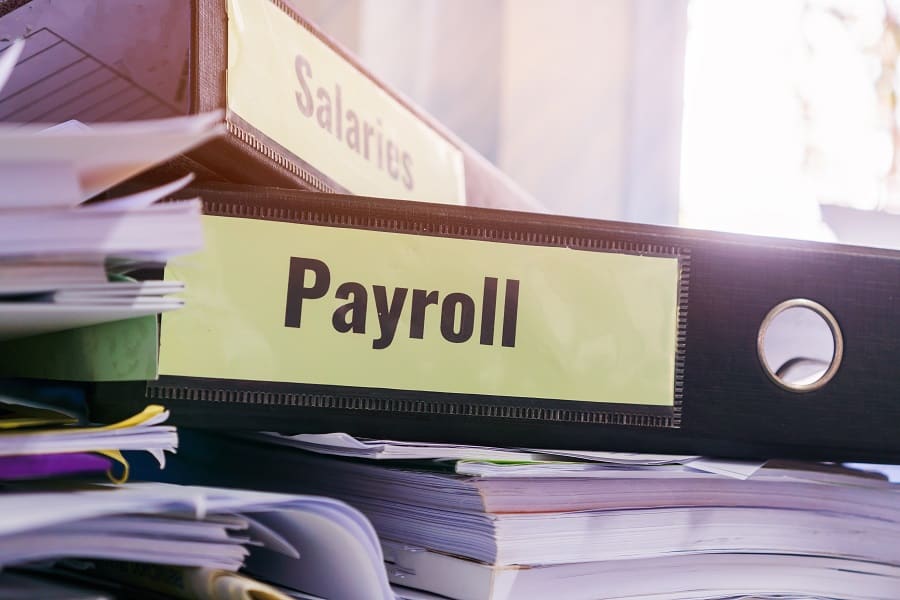How Long Should I Keep Payroll Records?
Written by: Coralee Bechteler
Coralee is a business writer with experience in administrative services, education, and software testing.
Reviewed by: Daniel Eisner
Daniel Eisner is a payroll specialist with over a decade of practical experience in senior accounting positions.
Updated on October 1, 2023

Recordkeeping is an essential element of any business’s human resources function, because businesses need proper records and documents to deal with issues that may arise, such as disputes and audits.
If you’ve recently started a business and are struggling with all the payroll-related terms, you’ve come to the right place. This guide explains what payroll records are and how they fit into the recordkeeping responsibilities of HR departments.
What Are Payroll Records?
Payroll records refer to all documents that detail employee compensation. A business will have employee payroll records for each worker, and it’s essential that HR appropriately retains them.

What Should Be Included in Payroll Records?
The information your HR team needs to monitor each employee’s payroll records is as follows:
- Employee name, address, Social Security number, and company role
- Employee start date and (if applicable) end date
- Pay period’s start and end dates
- Employee’s daily hours and total hours for the pay period
- Whether it’s an hourly or salaried employee
- Wage rate and total wages for the pay period
- Benefits, such as:
- Pension payments
- Retirement plans
- Paid time off
- Additions or deductions, such as:
- Overtime
- Bonuses
- Commissions
- Tips
- Overpayment correction
- 401K
- Multiple forms:
- W-2
- W-3
- W-4, W-4P, W-4S, W-4V
- W-5
- 941 or 944
Federal Legal Requirements
Government agencies regularly institute federal laws that detail the latest recordkeeping requirements, so it’s imperative that businesses implement practices that comply with current federal requirements. The IRS can deny tax deductions if a company being audited is unable to provide the necessary documentation.
Equal Employment Opportunity Commission
The Equal Employment Opportunity Commission, or EEOC, requires that all businesses keep all employment records for at least one year before disposing.
Age Discrimination in Employment Act
The Age Discrimination in Employment Act, or ADEA, requires that payroll records are kept for a minimum of three years. Any documents detailing employee benefit plans must be kept for the duration of their employment, plus one year after the relevant employee’s termination.
Fair Labor Standards Act
The Fair Labor Standards Act, or FLSA, requires that business owners keep payroll records for three years.
International Revenue Service
The International Revenue Service, or IRS, recommends that all payroll records are stored and maintained for six years. In addition to the records listed above, the IRS suggests that HR also keeps records of:
- The fair market value of in-kind wages paid
- All documentation on employee wage determinations
- Employee copies of Form W-2 and W-2c returned as undeliverable
- Dates and amounts of tax deposits made
- Including all acknowledgment numbers for deposits made via the Electronic Federal Tax Payment System, or EFTPS
- Copies of returns filed and related confirmation numbers
- Records of fringe benefits
- Employee reimbursements and documented substantiation
- Records related to sick pay and family leave
- Documented substantiation for any paid social security tax that was deferred
How Do I Store Payroll Records?
Payroll records can be stored electronically on a drive or online through a payroll service.
Of course, there’s always the more traditional way to store your records via paper, too.
Each option has its benefits and risks. Payroll records stored on a drive or online offer easier access, but they are also a greater security risk. Paper records can be kept handy in a secure spot, but they could get lost in a fire if they’re not properly stored.
It’s up to employers to determine which method works best for their business and its needs.

How Do I Dispose of Payroll Records?
No official protocols have been established to guide businesses through the disposal of payroll records, but we’ve put together some HR rules of thumb to help you through the process.
- Create a cheat sheet that lists the types or titles of the various relevant records
- Be sure also to identify each record’s minimum retention period
- Clearly note in a log when and which records have been disposed of
- Make yourself notes or set calendar reminders that detail when specific personnel records no longer must be stored and can instead be destroyed
- If your records are kept via paper, carefully shred or destroy them
- If your records are retained on a drive, delete them and empty trash/recycling bin
- If your records are with a payroll service, familiarize yourself with its practices and standards for disposing employee payroll records
Benefits of Payroll Record Retention
Reliable record retention has a number of benefits, such as enabling the business owner to verify all sorts of details on employee compensation and taxes paid. Proper recordkeeping also enables the provision of document copies upon an employee’s request.
Additionally, personnel payroll records facilitate any processes down the line that may require access to a business’s records, such as a merger or audit. The IRS can deny tax deductions if a company is being audited and can’t provide the necessary documentation.
Keep in mind that if your business provides records to the IRS that contain errors, the IRS may decide to dive deeper into your records and perform a more thorough audit. So accurate, reliable recordkeeping is crucial to smooth business operations.
Conclusion
The creation, accuracy, and proper retention of employee payroll records is important to the continued health of any business. While different agencies have different requirements for payroll records, the safest route is to establish a record retention practice that covers all the bases and meets all requirements.
We recommend that employers store all employee payroll documents for six years, which is the longest required retention period. After six years, HR can initiate disposal with confidence.
